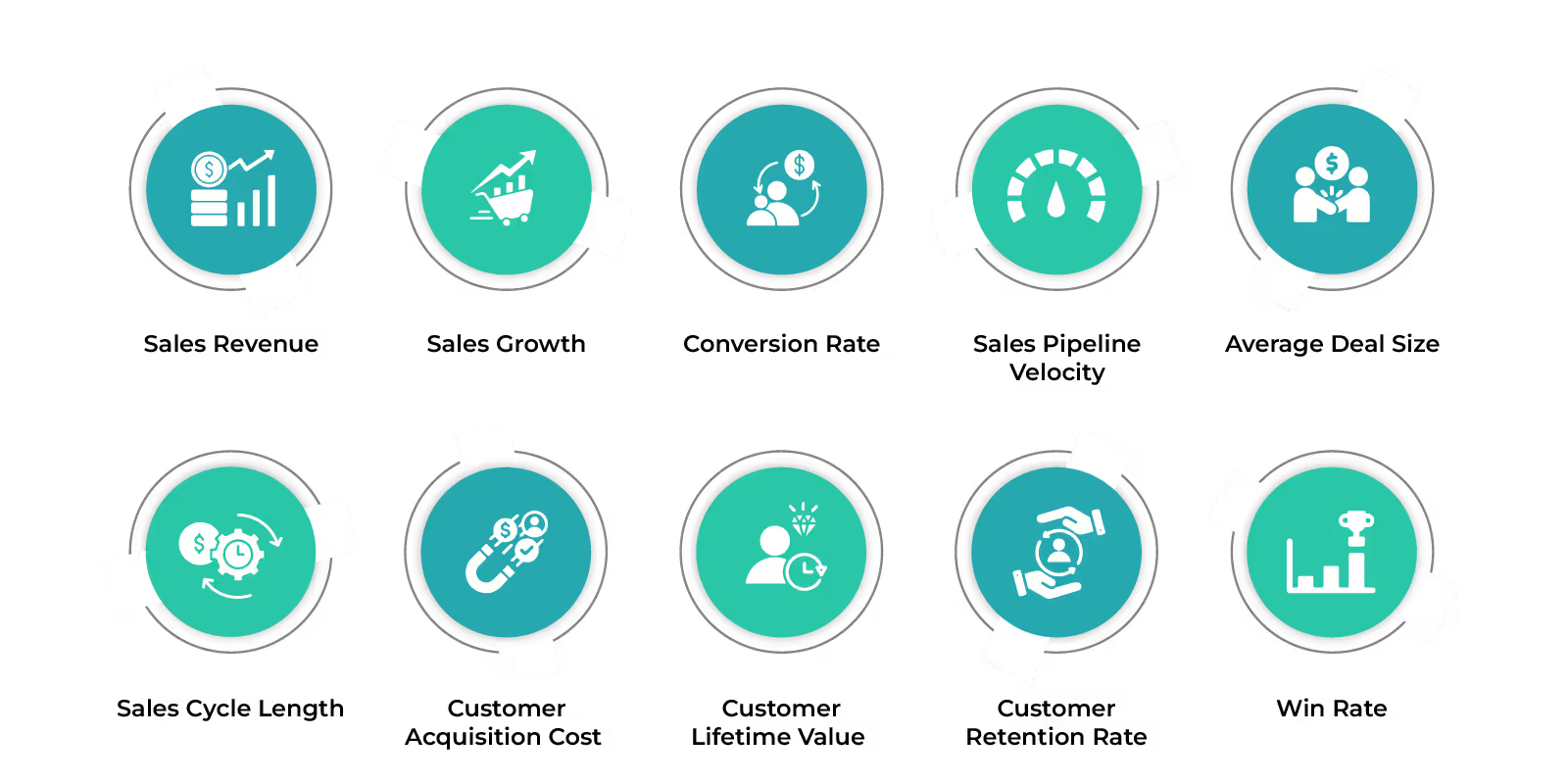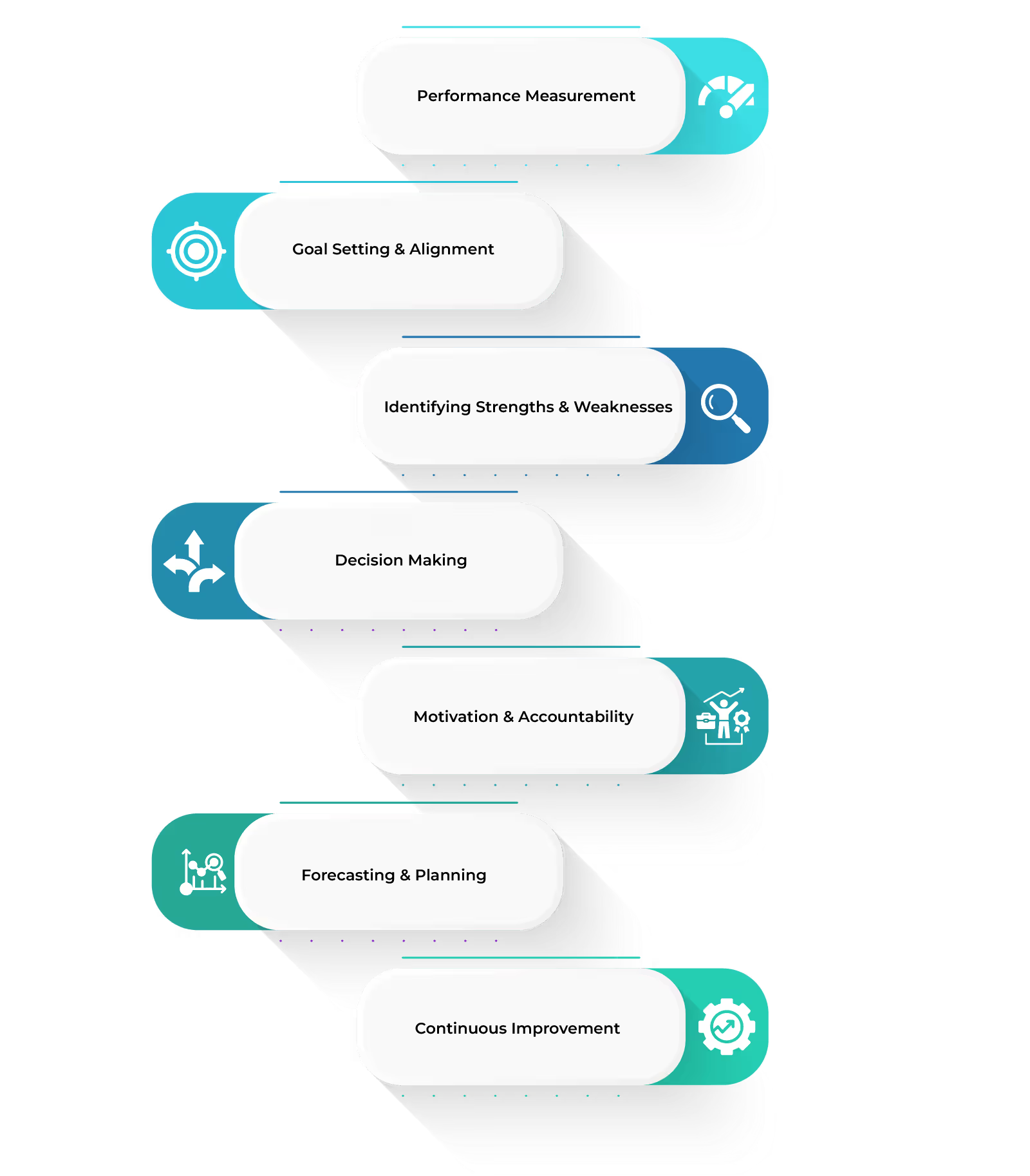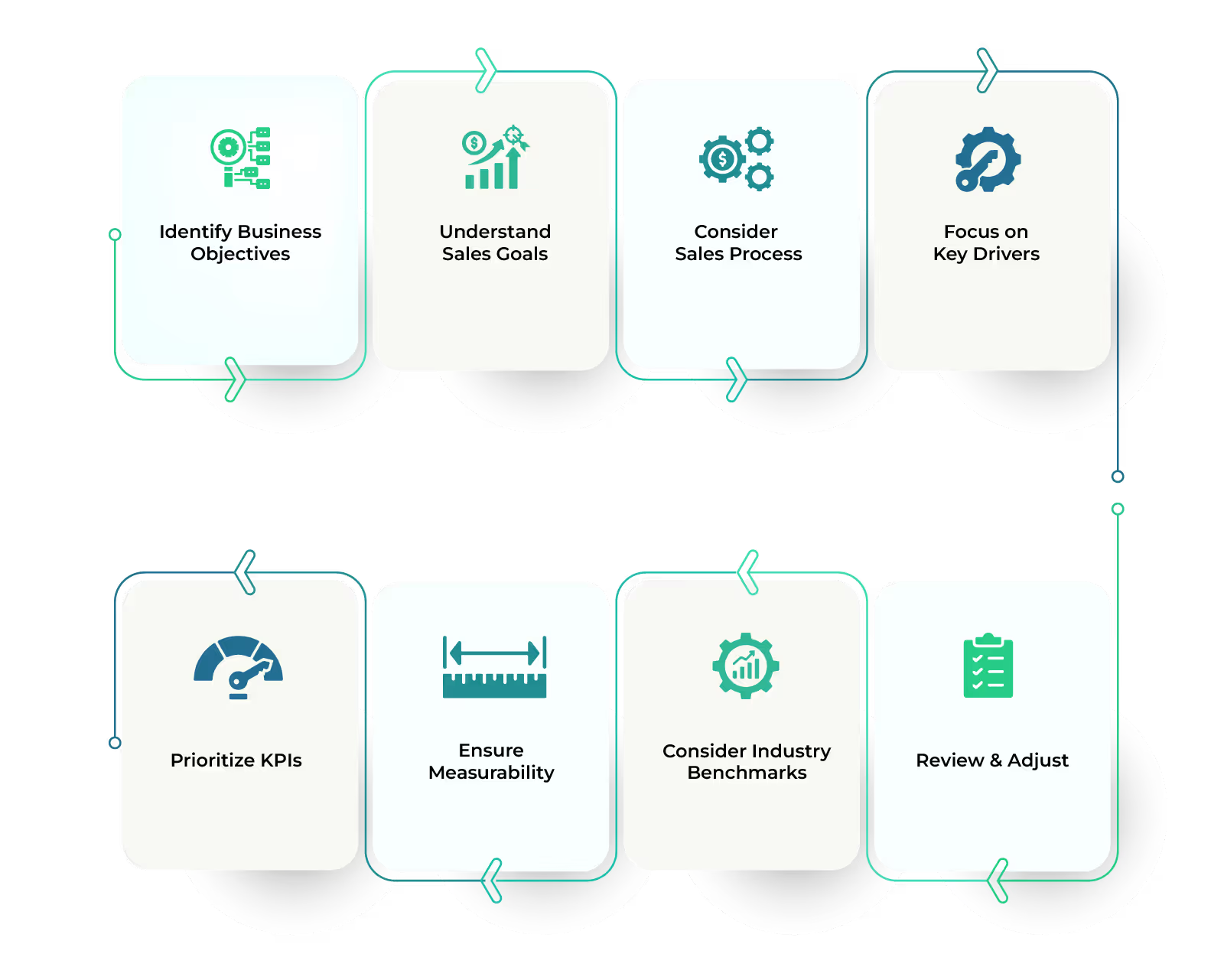
Blog
Selecting the Perfect Sales KPIs: A Strategic Approach
April 10, 2024


Key Insights
Here is a question for you! How well do you know your salesforce? Is your evaluation of their performance objective? Do you give them the necessary feedback and insights for improvement?
Expecting improvement from your salesforce when you haven't given them a sense of direction is like expecting a ship to sail smoothly without a compass.
Clarity in objectives is the cornerstone of progress.
Only when sales reps are clear about their role, responsibility, expected results and outcomes will they be able to perform with clarity and confidence.
It is this sense of direction, clarity, transparency and much more that sales KPIs provide.
In this article, we will give you a detailed understanding of sales KPIs, a few KPI examples, the importance of KPIs, the difference between sales metrics and sales KPIs, and a step-by-step guide to choosing the right KPI.
So let's begin reading…
What Are Sales KPIs?
Sales Key Performance Indicators refer to measurable parameters that organizations use for sales performance evaluation and determine the effectiveness of their sales process.
Sales KPIs help track progress, identify the strengths and areas of improvement, make objective evaluations, and make informed decisions to optimize the overall sales operations.
To give you a couple of examples, some common KPIs include:

- Sales Revenue: the total revenue generated by the sales rep in a given time period.
- Sales Growth: It is the measure of business growth reached through sales improvement over a period.
- Conversion Rate: The percentage of leads or prospects that were successfully converted into loyal customers.
- Sales Pipeline Velocity: The speed of conversion of leads from in-total contact to closing of the deal.
- Average Deal Size: refers to the average value of each sale closed by the sales team.
- Sales Cycle Length: The average time taken for a sale from the initial contact to the closing of the deal.
- Win Rate: The percentage of sales opportunities that were successfully turned into closed deals.
- Customer Acquisition Cost: The sales and marketing expenses incurred to acquire a new customer.
- Customer Lifetime Value: The total revenue expected from a client throughout their relationship with the company.
- Customer Retention Rate: The percentage of customers who continue to purchase your product over time.
While these are some of the more commonly used KPIs, it's important to note that the ideal KPIs that help evaluate your sales operations and management depend on the company, its employee size, the industry, sales goals, company objectives, etc.
Furthermore, integrating sales operations KPIs into a robust sales monitoring system enables organizations to establish benchmarks, track performance trends, and implement targeted interventions for continuous enhancement of sales operations efficiency and effectiveness.
Just like sales KPIs, sales operation KPIs are also relevant. Read more about it at Top 8 Sales Operations KPIs You Should Start Tracking.
Why are sales KPIs so important?
Sales rep performance metrics play a crucial role in the overall success of your sales. Let us look at some of these essential reasons why sales KPIs are important:

- Inside sales KPIs help make objective evaluations of your sales performance, process, operations, and management. It identifies the strengths and determines the areas of improvement.
- KPIs provide measurable metrics to evaluate sales efforts and performance against specific goals and objectives. Businesses can align these individual goals with the larger company objectives to ensure all efforts are streamlined to achieve the larger goals.
- KPIs help make objective evaluations of sales performance and sales team efforts against quantifiable metrics. This makes the evaluation process unbiased and transparent leading to enhanced employee engagement and loyalty.
- KPIs help identify the strengths and shortcomings in sales. A data-driven and objective analysis helps businesses make informed decisions to improve the shortcomings, appreciate the improvements, and optimize the overall performance.
- Sales teams feel motivated when there is clarity on what is expected of them- the role, responsibility, outcome, etc. This clarity and transparency enhances the effectiveness of their strategies, improves their performance, and ensures chances of on-target earnings.
- Sales KPIs do not just evaluate the current process. It also provides historical data on the performance and improvement of the sales rep, team, and the entire process. These insights help businesses anticipate the trends for the upcoming year and make informed decisions on setting sales quotas, planning incentives, and other business goals.
- A regular and objective evaluation of sales helps businesses keep track of the progress made, identify areas of improvement, and make informed decisions for optimizations. These consistent efforts ensure continuous improvement in the overall sales operations.
Hence, sales KPIs touch all areas of sales helping businesses anticipate changes, making required changes for improvement, and ensuring the success of sales teams and organizations.
What are sales metrics vs. sales KPIs?
Sales metrics and sales KPIs are often used interchangeably as both are used to evaluate sales performance. But there are key differences between them.
Here are some crucial differences between the two terms:
In essence, both sales metrics and KPIs serve as invaluable tools to measure sales performance, providing actionable insights for strategic decision-making and continuous improvement.
How to Choose the Right KPIs
There is a wide range of key indicators that help you evaluate your sales performance.
However, choosing the right ones that suit your organizational objectives and sales goals is important to ensure effective outcomes.
Let's take a step-by-step approach to choosing the right KPIs.

Identify Business Objectives
Businesses must clearly define their objectives and goals. This includes increasing revenue, improving customer satisfaction, expanding market share, etc. Deciding on your business objective will help in aligning the KPIs to achieve these goals.
Understand Sales Goals
Deciding your business goals will help in setting the individual sales goals. For example, if the business objective is to increase revenue, the sales goals will focus on increasing new customer acquisition, improving average deal size, etc.
Consider Sales Process
Businesses must craft effective sales processes that clearly define the customer journey from lead generation to closing deals. Identifying the key activities at each stage that contribute to the sales goal will help in setting the KPIs that contribute to its achievement.
Focus on Key Drivers
Moreover, by diligently tracking these sales KPIs, businesses can identify opportunities for incremental sales growth and optimize their strategies accordingly to maximize revenue potential.
Prioritize KPIs
Businesses must evaluate their larger objectives and align their sales goals and KPIs accordingly. The effort to choose relevant KPIs will drive performance improvement and yield the desired results.

Ensure Measurability
Businesses must choose KPIs that are measurable and quantifiable. This helps make objective evaluations of performance, make data-driven decisions, and gain insights for future forecasts and planning.
Unbiased performance evaluation will motivate employees, enhance their engagement, and make them loyal to the organization.
Consider Industry Benchmark
Companies' decision to choose particular sales operation KPIs must also be based on industry standards and competitor analysis. Considering such industry benchmarks will help businesses evaluate their sense of direction and make employees feel they are evaluated based on realistic metrics.
Review and Adjust
Every sales tool requires regular review and adjustments. In dynamic markets where the trends and competition change often, there needs regular evaluation through feedback gathering, effectiveness determination, and outcome.
Businesses must thus take a systematic approach while choosing the right KPIs to ensure they contribute to achieving their larger goals and objectives.
Final Thoughts
Sales Key Performance Indicators as the name suggests are metrics used to evaluate the performance of your sales representatives.
For businesses that rely on sales for their revenue and growth, the relevance of ensuring a high-performing and top-talented sales team is crucial.
Sales KPIs keep this requirement in check to ensure that the top performers are identified and the sales reps lagging are given the due coaching to enhance their efforts and performance.
Sales operations KPIs not only evaluate sales performance but also enhance sales operations by providing insights on the overall effectiveness of the sales process and operations, helping in forecasts based on historical data and thereby ensuring continuous improvement and growth.
However, implementing KPIs doesn't get the job done. To get the desired results, businesses must put the time and effort into choosing the right KPIs for their operations.
For example, SaaS sales KPIs will focus on the sales reps' ability in customer retention as their business growth relies on recurring revenue. While the e-commerce sales will focus on new customer acquisition.
Hence, selecting the perfect sales KPI is a strategic approach that businesses must work on to ensure effectiveness and desired results.
Have your KPIs all figured out, but can't seem to track them? Book a demo with us to learn more!
ReKennect : Stay ahead of the curve!
Subscribe to our bi-weekly newsletter packed with latest trends and insights on incentives.
Thank you! Your submission has been received!
Oops! Something went wrong while submitting the form.
Your data is in safe hands. Check out our Privacy policy for more info















